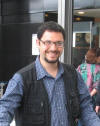DISCORPS CEEX Project - Human Resources - PostDoc - Module II PD-17 / Contract 1542 / 07.04.2006
Financed by Ministry of Education and Research, ROMANIA
24 months: October 2006 - March 2008
Discourse and Communication in the Romanian Public Space: Reflections of Values, Institutions, Language, Culture, History
Project Summary and Purpose
Project Objectives
Team Members - Postdoc Researchers
Team Members' Publications
Project Summary and Purpose
DISCORPS has
as a main goal to provide a description and analysis of an important number
of instances of discourse in the Romanian Public Space (RPS). The main
concern of the project is to provide insights to the way in which discourse
in RPS can contribute (role, significance, means and effects) to public
understanding and awareness of European challenges and contemporary needs.
Methodological assumption at the basis of the project: the descriptive, the
analytic, the comparative and the normative approaches to discourse and
communication in the Public Space can be combined to yield a complex view on
the steps to be taken towards European integration from the perspective of
shared understanding and respect for Europe's diversities (Otherness) and
commonalities (Sameness). DISCORPS originality: the idea that
value-specific, institutional, linguistic, cultural and historical aspects
are of prime importance in the structure of discourse evolving in the Public
Space; these are reflective of national and individual identities
illustrated by the concepts of Otherness and Sameness. DISCORPS employs 5
postdoctoral students with research responsibilities over 24 months. The
work is linked to similar research carried on nationally and internationally
and is part of the research programme of the two departments involved in the
project.
Project Objectives
1. Delimitation and definition of concepts: insights to
theoretical approaches to communication and discourse and to research
methodology in Social Sciences and Humanities
2. Definition of 'Public Space' (Integrating project research
into the social and academic environment; cooperation with actors in the
public space)
3.
Communication in the
Public Space: Private Versus Public Space
4. Description and analysis of Public Space discourse
specimens
5. The place of values, institutions, language, culture, and
history in the Public Space discourse
6. Reflections of Value-specific,
Institutional, Linguistic, Cultural, and Historical aspects in the Romanian
Public Space
7.
Normative insights to
discourse in the Public Space
Team Members - Postdoc
Researchers
1. Ion CORDONEANU, PhD

2. Alina Elena GANEA, PhD

3. Diana POPA, PhD

4. Gabriela SCRIPNIC, PhD

Team Members' Publications
CORDONEANU,
Ion
(2007).
Valorile democratice şi susţinerea lor publică în
rândul intelectualilor.
In
Anca
Gâţă & Adela Drăgan
(Eds), Communication
and Argumentation in the Public Sphere,
Proceedings of the First Conference, “Public Space versus
Private Space”, Volume I, Issue
3:
524-529. Galaţi: Galati University Press.
ISSN:
1843-7893
GANEA,
Alina Elena (2007). Coopération et
conflit dans l’espace public. Une analyse des faces dans le
talk show au sujet du film Trianon. In Anca
Gâţă & Adela Drăgan
(Eds), Communication and Argumentation in the
Public Sphere, Proceedings of the First Conference, “Public
Space versus Private Space”, Volume I, Issue 1: 36-43. Galaţi: Galati University Press. ISSN:
1843-7893
POPA,
Diana Elena (2007).
Affective vs Cognitive
Dimensions of the Cultural Public Sphere. In Anca
Gâţă & Adela Drăgan
(Eds), Communication
and Argumentation in the Public Sphere,
Proceedings of the First Conference, “Public Space versus
Private Space”, Volume I, Issue
1: 5-13.
Galaţi: Galati University Press.
ISSN: 1843-7893
VELICĂ,
Marius (2007).
Public
versus private: indicators of ad hominem fallacies.
In Anca
Gâţă & Adela Drăgan
(Eds), Communication
and Argumentation in the Public Sphere,
Proceedings of the First Conference, “Public Space versus
Private Space”, Volume I, Issue
1:
88-92.
Galaţi: Galati University Press.
ISSN: 1843-7893
|
Authors |
Paper
Title |
Conference |
Date |
City,
COUNTRY |
|
Diana POPA |
Humour and the
Celebration of Death: A Cultural-Linguistic
Introspection. The Case of the Săpânţa Graveyard |
18th
International Conference of the International Society for
the Study of Humour |
|
Copenhaga,
DANEMARCA |
| Ion
CORDONEANU Marius VELICA |
Religion and modernity in the
Romanian public space (In search of an explanatory
theoretical model)
Abstract |
International Conference Secularism and Beyond -Comparative
Perspectives |
May 29th - June 1st,
2007 |
University of
Copenhagen
Copenhagen, DENMARK |
|
Researcher
Name |
Mobility
Duration |
Dates |
Documentation /
Research
Site |
City,
COUNTRY |
| Marius VELICA |
1 week |
June 19th - 24th, 2006 |
Summer
School ELCO (École Thématique CNRS Linguistique de Corpus
Oraux,
Laboratoire LLING) |
Nantes,
FRANCE |
|
Gabriela SCRIPNIC |
6 weeks |
February 14th - March 31st, 2008 |
Laboratoire CNRS Communication et Politique |
Paris,
FRANCE |
Religion and modernity in the Romanian public space (In search of an
explanatory theoretical model)
Some analysts among those who study the phenomena of secularization and
laicization question the explanatory ability or the comprehensive force of the
categories “laicization” and “secularization” (although they do not contest
their descriptive pertinence). The main argument is that these notions do not
cover the essence of the phenomenon which represents the originality of our
world. The basic phenomenon (described as “the overturn of a situation implying
a global and explicit domination of the religious towards a situation which
could be described as a secondization and a privatization”) is put in relation
with another typical phenomenon of our political modernity – the dissociation
between the civil society and the state. The institutional order and the formal
rules of living in a society are considered natural results of the citizens’
deliberation and will, citizens who express themselves starting from the
recognized premise that the political order is not conditioned by religion and
does not exceed in time or in the value the citizens’ will, whose beliefs are
essentially private. Even more, this political order authorizes the coexistence
of a plurality of legitimate purposes. In this sense, there is at least a
separation of principles between the political and religious factors and the
need for the religious neutrality of the state. In this context, it becomes an
absolute necessity to redefine the basic notions which designate this phenomenon
(considered as a turning point in the European culture) called “the unchurching
of Europe”. Nowadays, religion has lost its capacity to model behaviours. In a
period in which we are witnessing the restructuring of the relations between the
public and the private spaces, the method of redefining the concepts
“secularization” and “laicization” can be applied, as well, to post-1989
Romanian realities, with the aim of better understanding the reactions of a
society in full process of democratization. A possible explanatory model for
these reactions should not forget the fact that modernity has been a historical
problem of the Catholic-Protestant tradition, and not of the Orthodox one. In
the contemporary world, the genuine and unique problem of Orthodoxy, as a
religious and institutional formula, is given by the fact that modernity is not
a natural product of its own tradition. And the distortions in reactions (not
only from institutional Orthodoxy, but also of a large of the Romanian society)
can be understood if we have in mind the desire to preserve a traditional
symbolic power in the Romanian culture and public space.
“Dialogue and
Communication in Science” Workshops
Discusions,
conclusions: Although the problems of values in the public space
have a primarily social and humanistic nature, the problem of
communication in the public space of the values of academic
research represents an issue of interest for all fields of
university research, the resulting conclusion pleading for the
importance of redefining – within the context of the project –
the concept of intellectual value. The expression of the major
problems of existence in the public space should be oriented
mainly towards the discursive functions of informative,
narrative and argumentative nature combining at the same time
the rethorical and dialectical aspects.

